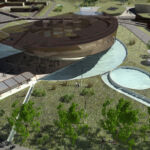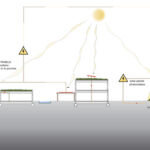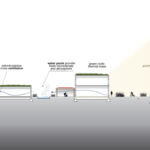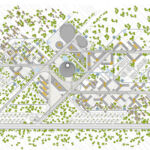Sustainable University Campus Design: Angola Central Highlands University
Project's Summary
XVSTUDIO Architectural Studio: Designing a Sustainable University Campus in Angola
XVSTUDIO, an esteemed architectural firm, was recently approached to take part in an international competition that aimed to develop a University Campus in Angola. The brief presented three key elements to be considered: the use of the fractal scale, the concept of "pools of light," and sustainability. Embracing these elements, XVSTUDIO crafted a visionary master plan that not only honored the local culture but also prioritized knowledge and wisdom.
The concept of "pools of light" was inspired by a memorable image the clients had from their trip to Angola. It depicted students gathered under a street light, engrossed in their studies. This phenomenon, common in Angola, symbolized the pursuit of knowledge. XVSTUDIO incorporated this idea into the project, using it as reference points within the master plan. These pools of light became more intense at the heart of the campus, gradually diffusing as they reached the surrounding environment.
To further enhance this concept, XVSTUDIO delved into the local culture and discovered the traditional Angolan art form known as lusona drawings. These intricate patterns, created by tracing lines around points on the sand, resonated perfectly with the idea of the pools of light. The lusona tradition holds great significance in transmitting knowledge and wisdom from one generation to the next. Hence, XVSTUDIO decided to incorporate these drawings into the master plan, ensuring the university would embody this rich cultural heritage.
Central to the campus design is the Windom Center, where all layers of information converge. This central hub serves as the intersection for the two main axes of the campus: Learning and Living. As these axes diminish, a network of paths connects various areas within the campus. Pedestrian circulation is prioritized, complemented by designated paths for bicycles and service vehicles, including solar-generated mini-buses and cars.
Sustainability was a key consideration throughout the project. Recognizing Angola's distinct rainy and sunny seasons, XVSTUDIO implemented measures to recycle and reuse water while minimizing wastage. Water canals were strategically integrated into the landscape design, serving both an aesthetic and functional purpose. These canals not only add to the visual appeal but also serve as irrigation sources for kitchen gardens and green spaces adjacent to residential buildings. Native greenery and planted grasses intertwine, creating a harmonious bond between the buildings and their natural surroundings.
In line with their commitment to sustainability, XVSTUDIO ensured the campus was self-sufficient, independent of external resources. Solar panels were installed, harnessing the abundant solar energy as the primary power source. Additionally, a network of pergolas was implemented to provide shade and protection from the rain along the paths, enhancing the overall comfort and experience for students and faculty.
XVSTUDIO's design for the Angola Central Highlands University project is a testament to their dedication to sustainable and culturally sensitive architecture. By incorporating the concept of "pools of light," drawing inspiration from lusona art, and prioritizing sustainability, XVSTUDIO has created a visionary campus that not only fosters knowledge and wisdom but also harmonizes with its natural surroundings. This project stands as a shining example of how architecture can seamlessly blend cultural heritage, sustainability, and functionality to create spaces that inspire and educate.
Read also about the Petrie Terrace: A Harmonious Blend of History and Modernity in Brisbane project






